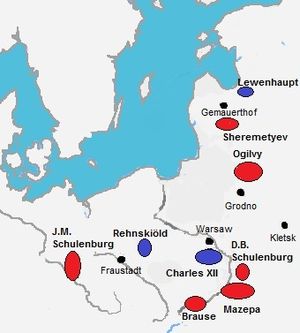| Campaign of Grodno | |||||||
|---|---|---|---|---|---|---|---|
| Part of the Invasion of Poland and the Great Northern War | |||||||
 Strategical view, late 1705 | |||||||
| |||||||
| Belligerents | |||||||
|
|
| ||||||
| Commanders and leaders | |||||||
|
|
| ||||||
| Strength | |||||||
| 51,000[a] | 117,500[b] | ||||||
| Casualties and losses | |||||||
|
6,900 or more in larger battles and sieges ..see casualties |
43,000 or more in larger battles and sieges ..see casualties | ||||||
The Campaign of Grodno was a plan developed by Johann Patkul and Otto Arnold von Paykull during the Swedish invasion of the Polish–Lithuanian Commonwealth, a part of the Great Northern War. Its purpose was to crush Charles XII's army with overwhelming force in a combined offensive of Russian and Saxon troops. The campaign, executed by Peter I of Russia and Augustus II of Saxony, began in July 1705 and lasted almost a year. In divided areas the allies would jointly strike the Swedish troops occupied in Poland, in order to neutralize the influence the Swedes had in the Polish politics. However, the Swedish forces under Charles XII successfully outmaneuvered the allies, installed a Polish king in favor of their own and finally won two decisive victories at Grodno and Fraustadt in 1706. This resulted in the Treaty of Altranstädt (1706) in which Augustus renounced his claims to the Polish throne, broke off his alliance with Russia, and established peace between Sweden and Saxony.
The campaign led to Sweden gaining control over the Polish–Lithuanian Commonwealth, until the Swedish defeat at Battle of Poltava and the Treaty of Thorn (1709) which restored the Russian-backed Augustus to the Polish throne and forced the remaining Swedes out of the Commonwealth.
Cite error: There are <ref group=lower-alpha> tags or {{efn}} templates on this page, but the references will not show without a {{reflist|group=lower-alpha}} template or {{notelist}} template (see the help page).